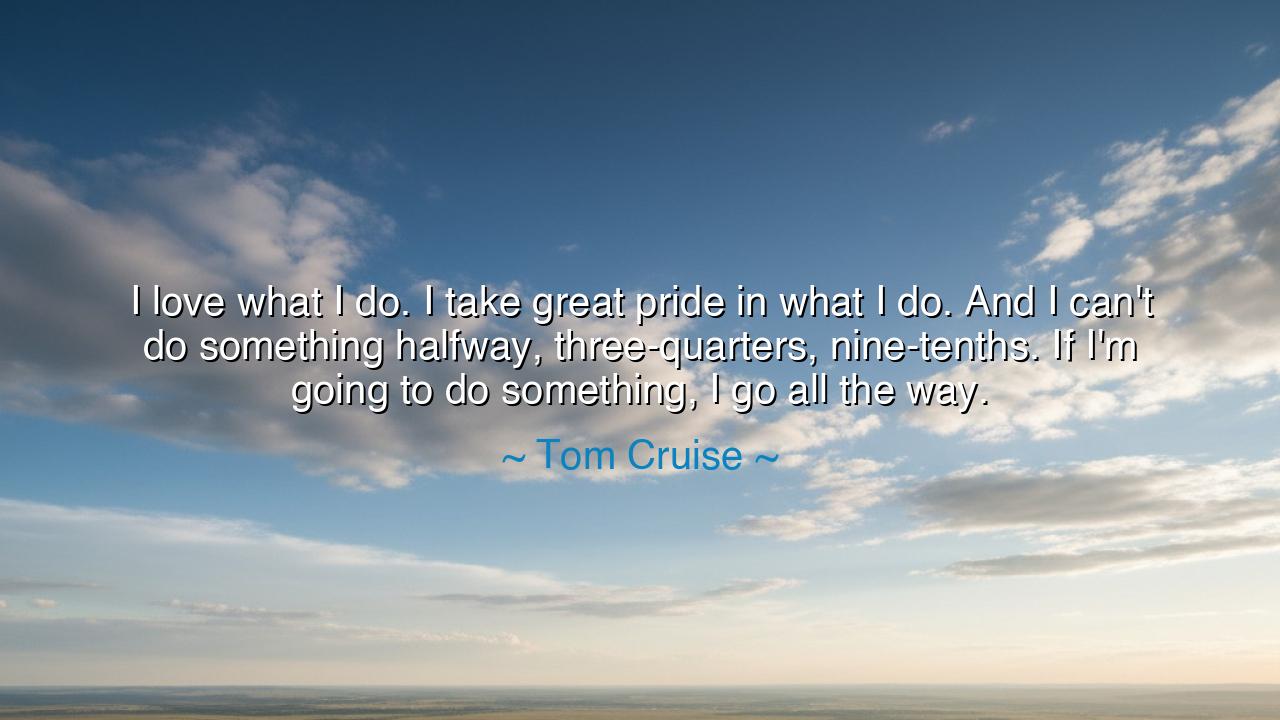
I love what I do. I take great pride in what I do. And I can't do
I love what I do. I take great pride in what I do. And I can't do something halfway, three-quarters, nine-tenths. If I'm going to do something, I go all the way.






In the voice of conviction and fire, Tom Cruise once declared: “I love what I do. I take great pride in what I do. And I can’t do something halfway, three-quarters, nine-tenths. If I’m going to do something, I go all the way.” These are not the words of vanity, but of devotion—of a man who has given his life to the mastery of his craft. In this simple yet thunderous statement lies an ancient truth: that greatness is born not from talent alone, but from total commitment, from the heart that refuses to rest until every drop of potential has been poured out in pursuit of excellence.
To the ancients, this spirit was known as arete—the excellence of purpose and performance. It was not enough merely to act; one must act with one’s whole being. The warrior could not draw his sword half-heartedly, nor the sculptor carve without reverence for the stone. Likewise, Cruise speaks as one who understands that true artistry demands wholeness—the union of body, mind, and spirit in every endeavor. To do less is to betray both the gift and the self.
When Tom Cruise speaks of going all the way, he calls us back to a forgotten code of honor—the creed of those who give themselves fully to their calling. Whether in the training of an athlete, the labor of a craftsman, or the devotion of a teacher, this same law reigns: that excellence requires sacrifice, focus, and relentless passion. For what is pride if not the satisfaction of knowing that one has held nothing back? The half-hearted may find comfort, but the wholehearted find immortality.
Consider the tale of Leonidas and the Spartans at Thermopylae. When faced with impossible odds, they did not fight to survive—they fought to embody their ideal. Three hundred warriors stood against a vast army, not because they expected victory, but because they believed in going all the way, in living and dying by the full measure of their code. Though they fell, their legacy endures because they refused to give less than everything. So too does the artist, the thinker, the dreamer leave their mark only when they commit without hesitation.
This is the heart of Cruise’s philosophy—not recklessness, but total presence. To live this way is to reject mediocrity in every form, to refuse to divide the self between passion and doubt. The man who goes “halfway” may find safety, but never glory. The one who “goes all the way” risks failure, exhaustion, even ridicule—but he lives with fire in his veins. And that fire, once lit, becomes a beacon to others who have forgotten what it means to truly care.
Such devotion requires love—the first words of his statement remind us: “I love what I do.” Love is the fuel of discipline, the secret that transforms duty into joy. Without love, effort becomes drudgery; with love, even struggle becomes sacred. The pride Cruise speaks of is not arrogance but gratitude—the satisfaction of one who honors his work by giving it the fullness of his strength. This is the warrior’s joy, the craftsman’s peace, the artist’s vow.
Let this then be a teaching for all who hear: whatever you do, do it with your whole heart. Do not skim the surface of your calling, nor tread softly where your spirit demands depth. If you study, study deeply; if you build, build beautifully; if you love, love entirely. The world does not remember those who almost tried—it remembers those who went all the way.
So rise each day with purpose, and when you face your task—whether grand or humble—say to yourself, as Tom Cruise once did: “I go all the way.” For in that resolve lies the ancient promise of greatness—that the soul which gives its all can never truly fail, for it has already achieved the noblest victory: the triumph of complete devotion.






AAdministratorAdministrator
Welcome, honored guests. Please leave a comment, we will respond soon